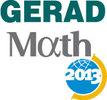HEC Montréal, Canada, 6 - 8 mai 2013
Journées de l'optimisation 2013
HEC Montréal, Canada, 6 — 8 mai 2013

TA8 Optimisation en santé - études de cas et nouvelles approches / Healthcare Optimization - Case Studies and Novel Approaches
7 mai 2013 10h30 – 12h10
Salle: Demers Beaulne
Présidée par Mathieu Cloutier
4 présentations
-
 10h30 - 10h55
10h30 - 10h55Towards Reducing Hospital Readmission: Mining Patients Admission Records
One in every five patients is readmitted to the hospital within 30 days of their discharge. In order to reduce high rates of readmission after hospitalization further information is needed about characteristics of patients, and possibly care providers, which increase the chance of readmission. This research describes the design, implementation, and preliminary evaluation of learning models to predict readmission based on administrative data. Our analysis on hospital systems in Quebec illustrates promising results in the direction of identifying patients with highest risk of readmission at the time of discharge.
-
 10h55 - 11h20
10h55 - 11h20Chemotherapy and Cytokine Responses in a Mathematical Model of the Human Hematopoietic System
We will present recent efforts to produce a mathematical model of the human hematopoietic system (regulation and control of the production of human blood cells) and use of that model to explore its response to the effects of chemotherapy: in particular, we assess the interactions between the "normal" feedback control mechanisms of regulating cytokines and the perturbations introduced by chemotherapy, trying to understand the effects of varying doses and frequency of administration. The model takes the form of a system of nonlinear delayed-differential equations.
The ultimate, long-range goal is to (minimally) understand whether or not current clinical observations can be given a theoretical understanding and hopefully to make suggestions about better ways to administer these compounds in order to minimize the damage to the hematopoietic system.
-
 11h20 - 11h45
11h20 - 11h45New Approaches to Cancer Treatment - The Role of Optimization
With the advent of molecular biology and high-throughput biological data, cancer treatment underwent major changes and breakthrough. However, the data-centric approach still shows major limitations. In this talk we will discuss the role that modelling and optimization should have in future research efforts, especially in terms of data analysis, prediction and hypotheses generation.
-
 11h45 - 12h10
11h45 - 12h10Continuous Prameterization for Evolutionary Optimal Control in Epidemiology
Evolutionary strategies can be effective global optimizers for optimal control of epidemics. The discrete parameterization methods currently used, however, limit the accuracy and usefulness of the resulting public health strategies. A new, continuous parameterization method is shown to provide quick and accurate solutions for a broad range of epidemiological models.

